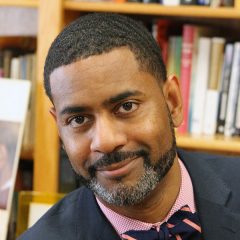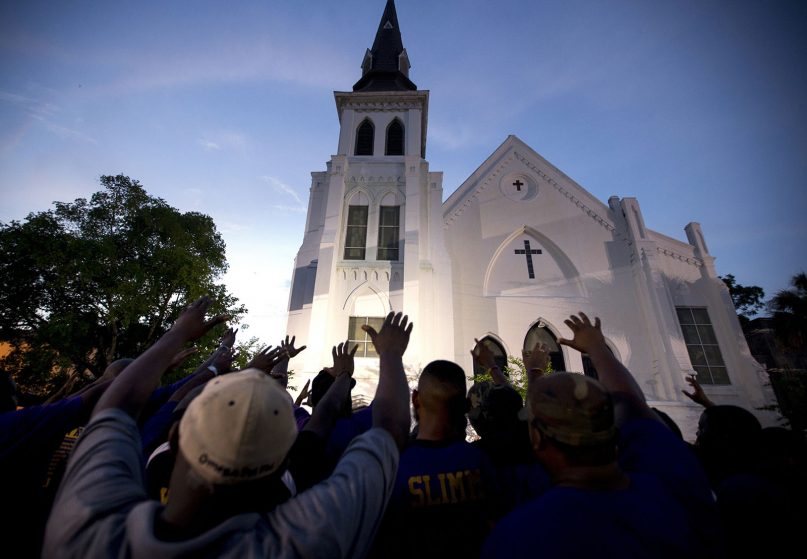(RNS) — Eight years ago, a young white man, 21 years of age, walked into the church in Charleston, South Carolina, known as Mother Emanuel, one of the oldest and most revered Black churches in the South.
The pastor was conducting Bible study when the young man, Dylann Roof, sat down next to him and joined the conversation. As the other worshippers began to pray, Roof unzipped his fanny pack, removed a handgun loaded with hollow-core bullets designed to do maximum harm and opened fire. He killed nine people. His goal was to provoke all African Americans to violence. He wanted, he said, “to start a race war.” News of the massacre sparked national outrage.
Such horrors claw at our spirit. How can we face them? How do we respond?
Only two days later, at Roof’s bond hearing, some of the survivors of the attack and some family members of the murdered victims spoke to the killer through a video link. They wanted to talk to him directly. What, you have to wonder, could they have felt at that moment? Did they want to scream out their rage and grief? Did they want the satisfaction of seeing the monster in chains, afraid for his life?
In this public setting, something unexpected happened. Far from screaming out their hate and pain, several grieving mothers, fathers and children of the murdered offered forgiveness to the murderer.
When these expressions of mercy spread in the media, some felt shocked. Mercy and grace are part of the African American church tradition, but even so, some prominent African American writers objected. Was it right to forgive a crime so terrible? In what way, commentators asked, did a cold-blooded killer who dreamed of war between the races deserve a pardon?
The answer is, Roof did not deserve it.
Did they not hunger for revenge? I get that hunger. Many of our movies and television shows celebrate it. They promise that vengeance will feed us, becoming our satisfaction and our empowerment.
But even when vengeance is deserved, it does not set things right. I say this not to make a moral judgment, but to state a practical fact. As Martin Luther King Jr. described in his sermon “Where Do We Go From Here?,” there is a practical limit to what violent retribution can do for us. “Through violence you may murder a murderer,” he wrote, “but you can’t murder murder. Through violence you may murder a liar, but you can’t establish truth. Through violence you may murder a hater, but you can’t murder hate through violence.”
Dylann Roof, unfortunately, was no exceptional outbreak of evil. That 21-year-old brother was not even born bad. Dylann Roof had been taught. He never finished high school, but he received a full education in race hatred, an affliction that diminishes the soul. That young man studied the world’s worst examples of institutionalized hatred, drinking in a long tradition of racist miseducation.
Because of that tradition, we have met Dylann Roof many times in the long struggle for freedom. Because of that tradition, we will meet him again, many times, in the future. The media gave us a long close-up on the villain as if he were an exceptional character, but if we imagine pulling back from that dramatic close-up, we can see not just the shooter but the place that shaped him.
When we widen our view to take in the history of this country, a country that enshrined in its Constitution the original sins of slavery and the destruction of the Indigenous peoples, we see at last why we are fated to meet Dylann Roof again, no matter how many times we catch and kill him. Far from being one mad dog, one unthinkably ugly anomaly, he is a person whose dark acts grew out of the darkness that has shadowed America from its genesis.
That darkness is expressed today, according to the Southern Poverty Law Center, in the record numbers of hate groups — over 1,000 separate organizations — now active across this country.
We live in a time when some Americans think it is acceptable to talk about slavery as if it were a job opportunity, a time when some Americans in their talk and actions and policies elevate the fascism of Nazi Germany. The goals of these groups are also served by policies and legislation that do not speak in the familiar terms of hate, such as the marijuana drug laws that have led since the Nixon era to the incarceration of so many young men of color. The ideas of these groups have seeped into our civic conversation and behavior. That old, hateful impulse toward race war is not gone but hidden.
The underlying toxic conditions and hateful traditions are what corrupt those few lost young men who become our Dylann Roofs.
We need a fresh response to violent tragedy.
As Ta-Nehisi Coates has argued, it is a false choice either to forgive or to take revenge. We must learn to grieve prophetically, seeing our world, even at its darkest, with the spirit and energy of the prophets of the Hebrew Bible.
In the Book of Proverbs, we are warned: “Envy not the oppressor and do not copy any of his ways.” When we grieve pathetically, we may come to imitate our oppressors, taking our revenge by answering outrage with outrage, violence with violence. We ignore the warning of the poet Audre Lorde: “For the master’s tools will never dismantle the master’s house. They may allow us to temporarily beat him at his own game, but they will never enable us to bring about genuine change.”
This is as true of small losses and injuries as it is of large ones. Ask instead: How could I live my spiritual values? How could I be part of a change in this home, this community, this nation or this world that makes it truer to the divine spark within us all?
That choice is not easy to make. Acts of hatred, brutality and terror, even many acts of plain old meanness, are purposeful. Part of their purpose is to dominate their victims—not just physically but psychologically; not just in the moment of the attack but through trauma that lasts. Dylann Roof said as much to the police. The goal of his violent spree was not nine deaths; it was ongoing war between people of different races — an enduring relationship of hate and harm. A poison for our souls.
Anger, fear and the fantasy of vengeance chain us to our enemy, and in that hellish struggle, we drag them with us wherever we go. It is exhausting. If we choose to fight in that kind of conflict, we have already given victory to the darkness, because fighting our war becomes our whole world.
What can stop that endless war? A grace that victims offer themselves, to break the chains that bind them to the ones who did them harm. In offering forgiveness, we say: Enough! I am so much more than the harm you did. The Creation is more than the evil you do. Your violence took a piece of my soul, but I won’t give you the rest.
The survivors and family members of those murdered by Dylann Roof chose not to accept the role he tried to force on them, as perpetual enemies in a race war. They affirmed the end to his power.

The Rev. Otis Moss III. Photo courtesy of Dawn Stephens
We forgive not as a gift of absolution for the victimizer but as resistance against the spiritual infections of despair, vengeance and chaos. We still seek accountability for evil acts, but we forgive in our hearts. Then we may discover that we can forgive not by diminishing ourselves, not by giving in, but by being true to our divine nature. This bold act of spiritual resistance is the simple refusal to be an actor or a prop in a script written by an alleged “oppressor“ who thinks they have all the power.
(The Rev. Otis Moss III is senior pastor of United Church of Christ in Chicago and a professor of homiletics at Mercer University McAfee School of Theology. This commentary is adapted from his latest book, “Dancing in the Darkness: Spiritual Lessons for Thriving in Turbulent Times” by permission from Simon & Schuster. The views expressed do not necessarily reflect those of Religion News Service.)





